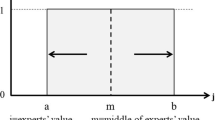Abstract
This paper discusses that there are two sorts of group consensus in Hall for Workshop of Meta-synthetic Engineering: draft consensus and decisive consensus, which are respectively formed in the two synchronous stages in the process of “synchronous stages 1- asynchronous stages-synchronous stages 2”, and focuses on the concept of draft consensus. Then proposes a draft consensus building model and its solution method called Consensus Building Graph, by which claim concern value, claim support value, claim authority value and claim consensus value can be calculated real time for reaching a consensus, and designs a computer aided consensus building system called Internet based Group Discussion Environment. The model follows the methodology of meta-synthesis from qualitative to quantitative analysis in which computers and humans are combined to solve complex problems.
Similar content being viewed by others
References
Qian X S, Yu J Y, Dai R W. A New Discipline of Science: The Study of Open Complex Giant System and Its Methodology[J]. Chinese Journal of Systems Engineering & Electronics, 1993, 4(2): 2–12.
Cao L B, Dai R W. On Meta-Synthesis and Decision Making [J]. Journal of Computer Research and Development, 2003, 40(4):531–537(Ch).
DeGroot M H. Reaching a Consensus[J]. Journal of the American Statistical Association, 1974, 69(345): 118–12l
Bennis W G, Shepherd H H. A Theory of Group Development[J]. Human Relations, 1956, 9: 415–437.
Gu J F. On Synthesizing Opinions-How Can We Reach Consensus [J]. Journal of Systems Engineering, 2001, 16(5): 340–348(Ch).
Ngwenyama O K, Bryson N, Mobolurin A. Supporting Facilitation in Group Support Systems: Techniques for Analyzing Consensus Relevant Data[J]. Decision Support Systems, 1996, l6: 155–168.
Herrera-Viedma E, Martínez L, Mata F, et al. A Consensus Support System Model for Group Decision Making Problems with Multigranular Linguistic Preference Relations[J]. IEEE Transaction on Fuzzy Systems, 2005, 13(5): 644–658.
Cui X, Dai R W, Li Y D. The Emergence of Collective Wisdom in the Hall for Workshop of Meta-Synthetic Engineering [J]. Journal of System Simulation, 2003, 15(1): 146–153(Ch).
Tan Bernard C Y, Teo H H, Wei K K. Promoting Consensus in Small Decision Making Groups[J].Information & Management, 1995, 28(4): 251–259.
Bryson N. Group Decision-Making and the Analytic Hierarchy Process: Exploring the Consensus-Relevant Information Content[J]. Computers & Operations Research, 1996, 23: 27–35.
Herrera-Viedma E, Herrera F, Chiclana F. A Consensus Model for Multi-Person Decision Making with Different Preference Structures[J]. Systems, Man and Cybernetics, Part A, IEEE Transactions, 2002, 32(3):394–402.
Eklund P, Rusinowska A, De Swart H. Consensus Reaching in Committees [J]. European Journal of Operational Research, 2007, 178(1): 185–193.
Dess G G. Consensus on Strategy Formulation and Organizational Performance:Competitors in a Fragmented Industry[J]. Strategic Management Journal, 1987, 8: 259–277.
Priem R L, Harrison D A, Muir N K. Structured Conflict and Consensus Outcomes in Group Decision Making[J]. Journal of Management, 1995, 21(4):691–710.
Gu J F, Tang X J. Meta-Synthetic System Modeling[J]. Complex Systems and Complexity Science, 2004, 1(2): 32–42(Ch).
Author information
Authors and Affiliations
Corresponding author
Additional information
Foundation Item: Supported by the National Natural Science Foundation of China (69775022) and the Natural Science Foundation of Hubei Province (2007ABA025)
Biography: XIONG Caiquan (1966–), male, Ph. D. candidate, Associate professor of Hubei University of Technology, research direction: pattern recognition and artificial intelligence.
Rights and permissions
About this article
Cite this article
Xiong, C., Li, D. & Jin, L. Draft consensus building in hall for workshop of meta-synthetic engineering. Wuhan Univ. J. Nat. Sci. 13, 45–49 (2008). https://doi.org/10.1007/s11859-008-0109-1
Received:
Published:
Issue Date:
DOI: https://doi.org/10.1007/s11859-008-0109-1




